Best Shoes for Parkinson’s Patients
Medical information provided by Josh White DPM / Written by OrthoFeet Team on October 22, 2023 Blog HomeIf you or a loved one have been diagnosed with Parkinson's disease, you probably already know that it is a progressive neurological disorder that affects movement.
Parkinson's disease affects millions of people worldwide. It can cause a wide range of symptoms, including tremors, stiffness and balance problems, which can significantly impact a person's mobility and quality of life.
One area where people with Parkinson's disease can benefit is by choosing the right shoes. Shoes with good support, traction and comfort can help prevent falls, improve balance and reduce foot pain.
In this article, we will provide recommendations for shoes that are suitable for Parkinson's patients, including features to look for.
Best walking shoes for people with Parkinson's
Women’s Kita | Men’s Yari
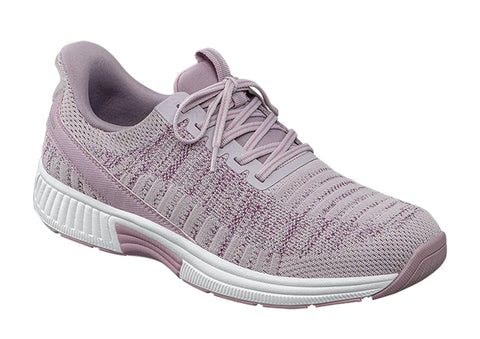
Why you’ll like it
- Genius hands free wear
- Super fashionable
- Supportive and comfortable
Specifications
- Sizes: women 5-12; men 7-14
- Widths: women Standard (B) - Extra Wide (2E); men Standard (D) - Extra Wide (4E)
- Upper materials: stretch knit
There’s nothing like simply stepping into your sneakers without using your hands or bending over, and this is especially true if you have Parkinson’s, as it can help you maintain your independence.
Putting on shoes is a small but significant task that can become increasingly difficult for individuals with Parkinson's disease. The hands-free Kita (available in rose, gray and black) and Yari (available in black and gray) sneakers are specifically designed to address this problem, by allowing you to effortlessly slip into your shoes without any need for bending down or fiddling with laces.
This magic is made possible by a patented hidden spring that bends when you insert your foot and then springs back as soon as the foot is secured in the shoe.
Moreover, these shoes are designed with a cushioned, ergonomic outsole and orthotic insole with anatomical arch support to provide excellent support, stability and cushioning. This can help reduce the risk of falls and other injuries that are common among Parkinson's patients.
The shoes also feature a stretch knit upper that conforms to the contours of the feet, providing superior comfort and support and eliminating pressure points.
So, if you’ve been looking for the best walking shoes for women, or the best walking shoes for men, it seems like you have finally found them.
Best Slippers for Parkinson's patients
Women’s Louise | Men’s Hudson
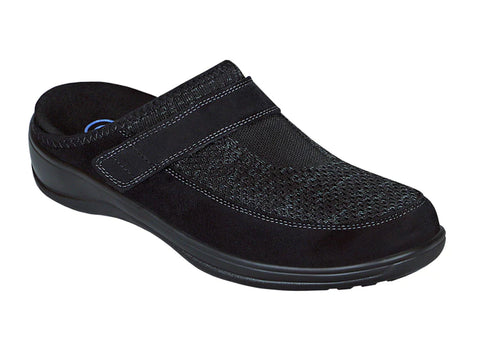
Why you’ll like it
- Adjustable fit
- Forms to the contours of your feet
Specifications
- Sizes: women 5-12; men 7-14
- Widths: women Narrow (A) - Extra Wide (2E); men Standard (D) - Extra Wide (4E)
- Upper materials: stretch knit
You can slip your feet into the Louise and Hudson slippers without using your hands or bending down.
But, while these slippers have an open back they also come with an adjustable strap, which secures fit and grip, providing extra stability and support to the foot. The strap can be easily adjusted to ensure a snug fit, reducing the risk of slips and falls, which can be particularly dangerous for people with Parkinson's disease.
The adjustable strap is also especially beneficial for Parkinson's patients who experience foot swelling or changes in foot size due to the condition's motor symptoms, as it can be adjusted to accommodate these changes, ensuring a comfortable and secure fit at all times.
Thanks to their wide and roomy toe box, the Louise and Hudson slippers offer ample space for the toes to move freely, reducing the risk of pressure points, blisters and irritation. They also have a lightweight and comfortable design with a mild rocker bottom that helps walk with less effort and reduces the risk of falls.
Best Sandals for Parkinson's patients
Women’s Lyra
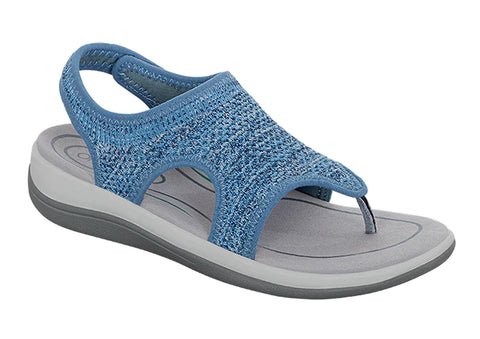
Why you’ll like it
- Adjustable heel strap
- Stretchable upper
Specifications
- Sizes: 5-12
- Widths: Standard (B) - Wide (D)
- Upper materials: stretch fabric
Lyra sandals are great for people who struggle with mobility issues.
One of the standout features of these sandals is the Velcro back strap, which can be opened wide to make putting on and taking off the sandals much easier. This is especially helpful for those who may have limited range of motion in their hands. The back strap also provides additional support and stability, helping to reduce the risk of falls.
The Lyra sandals feature a stretch knit upper that hugs the foot, providing a comfortable and customized fit. The stretchy material also accommodates any swelling or changes in foot size that may occur throughout the day, making them an excellent choice for Parkinson's patients who may experience these issues.
These sandals also have a soft and thin toe post that prevents irritation between the toes.
The cushioned sole, combined with their lightweight design, means that walking requires less effort and reduces the risk of falls.
Finally, the Lyra sandals are stylish and versatile, making them an excellent choice for everyday wear, and the sleek design means they can be dressed up or down, depending on the occasion.
Men’s Gemini
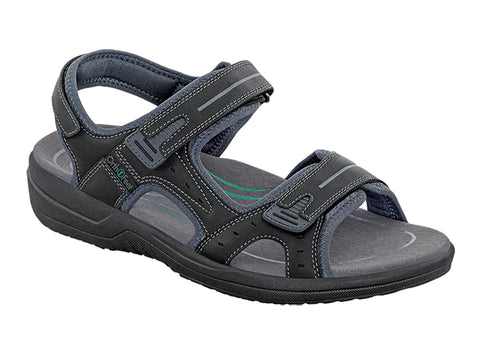
Why you’ll like it
- Fasten on both sides of the sandal with a two-way strap
- Advanced grip outsole
Specifications
- Sizes: 7-14
- Widths: Standard (B) - Extra Wide (4E)
- Upper materials: leather
Gemini Sandals are an ideal choice for men with Parkinson's disease who experience mobility issues.
The two-way strap design is particularly beneficial for those who have difficulty fastening and unfastening shoes from the outside, as it allows you to effortlessly slip your feet into the sandals and secure them on either side with minimal effort.
In addition to the two-way strap design, the sandals feature two more straps - one at the heel and one across the toes - that allow for a customized fit. You can easily adjust the straps to accommodate your unique foot shape, ensuring a secure, snug and comfortable fit that won't cause rubbing or irritation.
The soft leather upper of the sandals provides a non-binding fit that can help prevent discomfort or irritation. The leather is pliable and comfortable, offering a gentle touch against the skin.
Moreover, the rubber outsole of the sandals provides advanced grip, which is particularly beneficial for people with Parkinson's disease who may experience balance issues. The grip provides added stability and helps prevent falls, which can be a significant concern for those with mobility issues.
Best Boots for Parkinson's patients
Women’s Dakota | Men’s Ridgewood
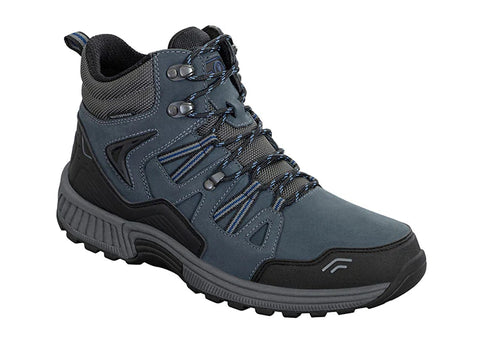
Why you’ll like it
- Waterproof
- Lug outsole
Specifications
- Sizes: women 5-12; men 7-14
- Widths: women Standard (B) - Extra Wide (2E); men Standard (D) - Extra Wide (4E)
- Upper materials: leather
These boots feature advanced orthopedic features that ensure your feet, including your ankles, are kept in the proper position, which can reduce the risk of falls and improve balance. This support is especially vital for Parkinson's patients, who may experience tremors and difficulty walking.
The waterproof membrane of these boots keeps water out but allows moisture to escape, ensuring that even if the wearer encounters wet or rainy conditions, their feet remain dry and comfortable. The high-quality water-sealed leather also plays a significant role in keeping the feet dry by repelling moisture and preventing it from seeping into the boots.
Additionally, the Dakota and Ridgewood boots offer exceptional traction and stability, thanks to their rubber lug outsole. This outsole provides excellent grip on various surfaces, ensuring you can walk confidently and without fear of slipping or losing your footing.
Despite their advanced orthopedic features and rugged construction, these boots are surprisingly lightweight, which enhances comfort during extended periods of wear and improves ease of walking.
What kind of shoes should Parkinson's patients wear?
If you have Parkinson's disease, your shoes should provide excellent support and stability to your feet and ankles. Shoes with a firm sole, a wide base and good arch support can help to improve balance, reduce the risk of falls and alleviate foot pain.
It is also important to wear shoes that fit well and are comfortable and lightweight. Shoes that are too heavy or too tight can cause discomfort, while shoes that are too loose can increase the risk of falls.
You may also benefit from shoes that have a low heel, as higher heels can throw off balance and increase the risk of tripping.
Finally, choose shoes that are easy to put on and take off, as this can help to reduce frustration and make it easier to get dressed independently. Shoes with velcro closures or slip-on designs can be particularly helpful in this regard.

